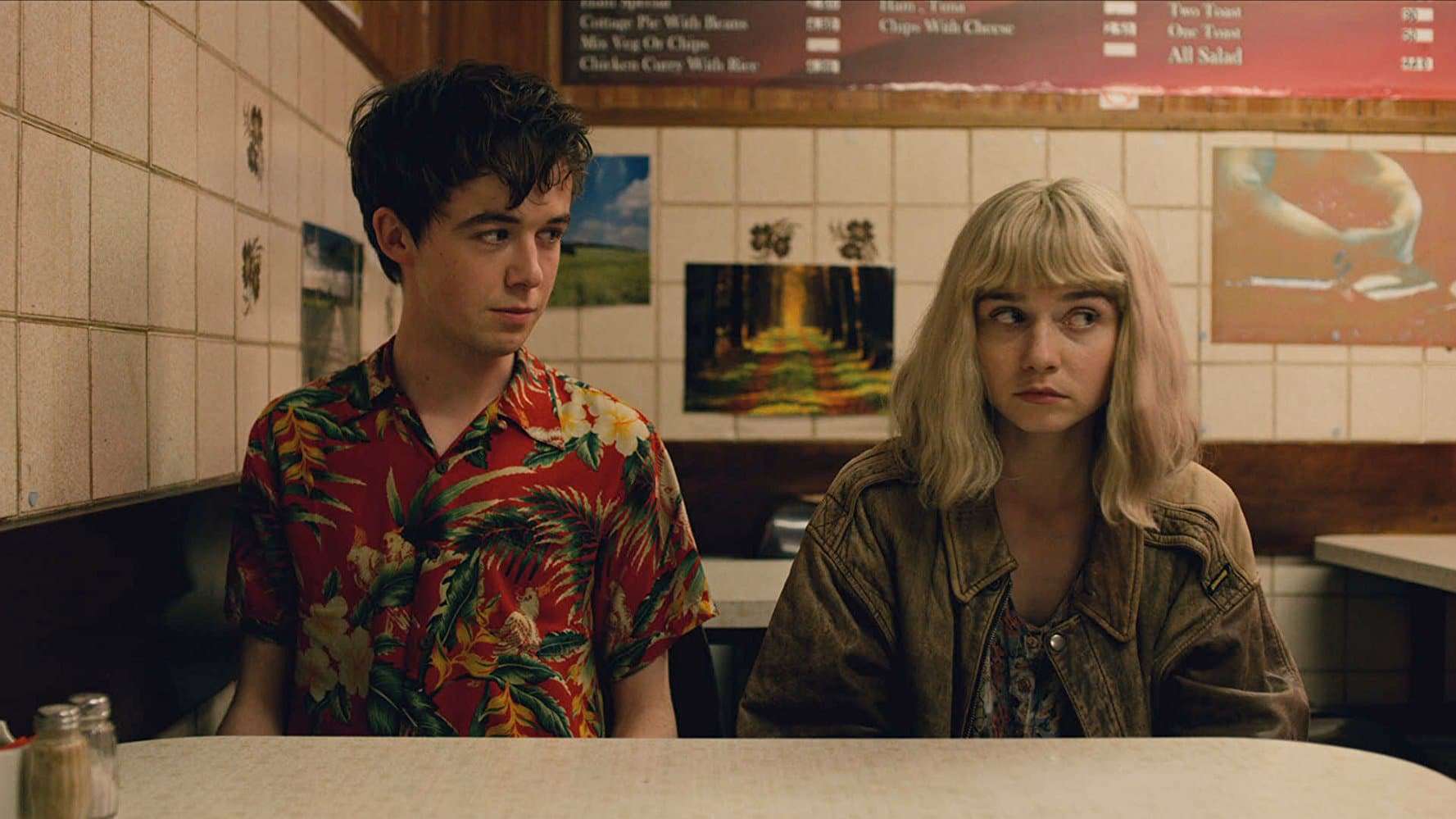“If this was a film we’d probably be American.”
Movies and shows about young rebels in love will never grow old, and while I could add “unlike viewers” I think it’d be redundant. We all age, and it’s our memories of youth — and perhaps our occasional desire to return — that keep interest in these themes endlessly relevant. The criminally rebellious part in particular is a path not taken my most, and it adds an even stronger allure to onscreen pairings in the likes of Bonnie & Clyde or True Romance. Their behavior isn’t being condoned or excused, but it’s an adventure we’ll never share (powered by a love we hopefully do).
The latest entry into the sub-genre is the appropriately titled The End of the F***ing World, and in addition to being the most binge-worthy Netflix original yet — there are only eight episodes, and they average just over twenty minutes each — it’s also already a front-runner for 2018’s best new show.
James (Alex Lawther, Black Mirror) is a budding sociopath whose dabbling in pretend emotions and animal slaughter has left him ready for the next step — murder. Alyssa (Jessica Barden, Hanna) is his classmate, and while she’s indifferent to those around her she’s pissed off about them all anyway. They meet in the cafeteria, and rather than love at first sight it’s more like begrudging acceptance because really, what else is there to do?
She’s looking to kill time, and he’s looking to kill her. Welcome to the new romance.
The young, not-quite lovers set out on a road trip to get away from their lives, and more purposefully, to visit Alyssa’s estranged father who left when she was much younger. It’s a bumpy ride involving robbery, grand theft auto, sexual antics, and at least one violent death, but what starts as a somewhat familiar tale grows into something surprising, affecting, and ridiculously entertaining. James and Alyssa are far more than the character cliches they first seem to be.
Their shared yet disparate darkness comes from specific places in their lives, and as it’s teased out across the episodes these truths inform the characters in revealing and rewarding ways. It’s not about excusing their actions — it’s about understanding a pair of kids who’ve been dealt a shitty hand and are dealing with it the best they can. More than that, it’s about the strength they find in themselves when they’re together.
Creator Jonathan Entwistle (who also co-wrote and co-directed the season) crafts the pair from the ground up as rough, raw personalities whose behaviors are both engaging and off-putting. We’re entertained early on thanks to smart, funny dialogue, a killer score/soundtrack (you’ll immediately want to buy), and a pair of fantastic lead performances, but it’s over time that we come to truly love and care about these characters despite the things they’ve done.
Every element here plays a part in that, but the inclusion of voice over from each of them — typically the death knell of many a film/show before now — works beautifully and effortlessly to transcend their actions and instead connect our hearts, minds, and funny bones with the “sociopath” and the “bitch.” Insecurities, doubts, fears, and moments of real sweetness remind of us of our own teen years, the first loves we’ve long since left behind, and the incredibly poor decisions we’ve made along the way.
Lawther and Barden both seem tailor-made for these characters as they nail the confusion and reactionary behavior of teenagers perfectly. Just as he did in Black Mirror’s “Shut Up and Dance” episode, Lawther walks a delicate line with our perceptions of his actions and expressions — we can’t necessarily forgive him but goddamn do we feel for him. Barden, meanwhile, is the picture of entitled, disaffected youth, but cracks begin to show in quick glances and increasingly less confident movement. Their pains hurt, but their triumphs soar.
The show connects so well with its dark themes and emotional beats, but its brightness deserves equal acclaim. Bright as in cinematography — it’s a vibrant and visually attractive show — but also in the joyous nature of its sense of humor. For every laugh that comes with a dollop of misery another lands built purely on character and situation. It’s a very funny show.
It’s unclear if Netflix is planning a second season of The End of the F***ing World, but if not these eight episodes remain a beautifully complete experience. They pack a lot of emotion, humor, and humanity into a relatively short running time, and it’s time well-spent in a world that isn’t ending any time soon.
The End of the F***ing World is currently streaming on Netflix.
[One quick aside for sensitive viewers — we don’t see James’ early animal murders, but we do see the results in a neatly-arranged, Wes Anderson-like montage. More disturbing, though, is an animal death late in the season. It’s all in the editing and effects, but fair warning to dog lovers.]

